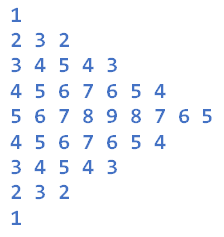CREATE OWN LIBRARY
Number Pattern 16
Back to ProgrammingDescription
Number Pattern:

The number of lines are taken as input. The number of lines of this pattern should be odd. The pattern is divided into two halves, in the first half the number of elements is increased and in the second half, the number of elements is decreased.
Algorithm
INPUT: The number of lines
OUTPUT: the aforesaid pattern
PROCESS:
Step 1: Read n [number of lines]
Step 2: [printing the pattern]
If n mod 2≠0 then
Set d<-n/2+1
For i=1 to d repeat
Set p<-i
For j=1 to i repeat
Print p
Set p<-p+1
[End of ‘for’ loop]
Set p<-p-2
For k=j-2 to 1 repeat
Print p
Set p<-p-1
[End of ‘for’ loop]
Move to the next line
[End of ‘for’ loop]
For i=i-2 to 1 repeat
Set p<-i
For j=1 to i repeat
Print p
Set p<-p+1
[End of ‘for’ loop]
Set p<-p-2
For k=j-2 to 1 repeat
Print p
Set p<p-1
[End of ‘for’ loop]
Move to the next line
[End of ‘for’ loop]
else
print "the number of lines should be odd"
[End of ‘for’ loop]
Step 3: Stop.
Code
Time Complexity:
for(i=1;i<=d;i++)--------------------------------------------------------------- n/2+1
{ p=i;
for(j=1;j<=i;j++)--------------------------- i
{ printf("%d ",p);
p++;
}
p-=2;
for(k=j-2;k>=1;k--)------------------------- j-2
{ printf("%d ",p);
p--;
}
printf("\n");
}
for(i=i-2;i>=1;i--)---------------------------------------------- n/2
{ p=i;
for(j=1;j<=i;j++)------------------------------------ i
{ printf("%d ",p);
p++;
}
p-=2;
for(k=j-2;k>=1;k--)----------------------------------- j-2
{ printf("%d ",p);
p--;
}
printf("\n");
}
The complexity is: O(((n/2+1)*(i+j-2))+((n/2)*(i+j-2)))=O()
Related
Contributed by

